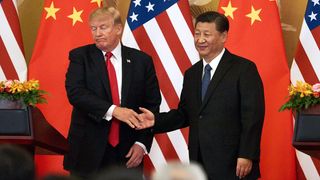How should Washington deal with an authoritarian regime that is expanding its influence abroad and repressing its citizens at home? That is the question the United States faces today in dealing with Xi Jinping’s China. But it is not a new challenge. After World War II, the United States faced another authoritarian state intent on expanding its borders, intimidating its neighbors, undermining democratic institutions, exporting its authoritarian model, and stealing US technology and know-how. The result, after a period of initial debate and uncertainty in US policy, was the Cold War: a 40-year competition over power, influence, and the contours of global order.
As tensions between Beijing and Washington harden, there is a growing fear that China and the United States are entering a new cold war—another multi-decade struggle to shape the international system. There is also a growing debate about who or what is responsible for the deterioration in the relationship. Is it the vaulting ambition and personalistic rule of Xi Jinping? The nature of Communist rule in China? The tragic qualities of international relations? America’s own behavior and global ambitions?
USSC senior fellow Charles Edel and Johns Hopkins University’s distinguished professor of global affairs Hal Brands have written this article for Foreign Policy.







